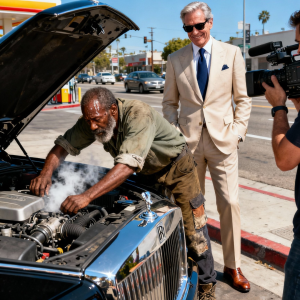
When Edward Carrow took over as CEO of Vantage Dynamics, he came with a reputation for being ruthless, stylish, and obsessed with appearances. The board had chosen him to “modernize the brand,” and Edward was determined to do exactly that. Within weeks, he replaced half the management team and imposed a new dress policy, declaring that “professionalism starts with presentation.”
One gray Monday morning, during a department review, his eyes fell on a quiet woman sitting near the back. Her name was Serena Miles. She worked in accounting, spoke little during meetings, and dressed modestly. That day, she wore a cream blouse, an old blazer, and simple shoes that had clearly seen years of wear.
After the meeting ended, Edward called her aside. “Miss Miles,” he said, straightening his cufflinks, “this company is about excellence and image. We need people who look like they belong in the future. You might want to consider investing in better clothes if you intend to stay here.”
The room went silent. Serena nodded once, without emotion, and walked away.
Three days later, she received a formal notice of dismissal for “failing to meet corporate presentation standards.” She packed her few belongings quietly while other employees watched, too afraid to speak up.
Edward barely remembered the incident a week later. He was preparing for what he considered his first real triumph — a high-profile meeting with a European investment group preparing to acquire a controlling share of Vantage Dynamics. The deal was worth billions and would define his legacy.
The investors arrived on a crisp Thursday morning. Edward straightened his tie as he entered the glass conference room, ready to impress. But the moment the doors opened, his confidence vanished. Leading the delegation was Serena Miles.
Gone was the plain blouse and worn shoes. She wore a tailored charcoal suit, her presence commanding yet composed. She extended her hand. “Good morning, Mr. Carrow,” she said evenly. “I believe this will be an important conversation for both our organizations.”
Edward’s pulse raced. “You’re with the investors?” he asked, his voice barely steady.
Serena smiled politely. “I am the founder and majority owner of Miles Capital Partners.”
The color drained from his face.
Years earlier, Serena had founded her private investment firm after a decade on Wall Street. She had built her fortune quietly, acquiring undervalued companies and restoring them to strength. Her philosophy was simple: invest in people, not pretenses. Vantage Dynamics had caught her attention after years of declining innovation and rising ego-driven leadership. She wanted to observe the company culture before finalizing the acquisition, so she took a temporary position under an alias to see how employees were treated.

Edward’s arrogance had given her all the confirmation she needed.
Now, seated at the head of the table, Serena opened the presentation herself. “Miles Capital will proceed with the full acquisition of Vantage Dynamics,” she began. “However, the executive team will undergo a complete restructuring, effective immediately.”
Edward stammered, “This is outrageous. You can’t—”
“I can,” she interrupted calmly. “And I already have board approval. You may collect your personal belongings after this meeting.”
The board members avoided his gaze. They knew the decision was final. Serena had quietly purchased their shares months ago. She now owned the majority stake.
Within forty-eight hours, financial media outlets across New York and London ran the headline: “Miles Capital Acquires Vantage Dynamics in $2.8 Billion Takeover — CEO Dismissed Amid Scandal.”
Edward disappeared from the business scene, his name whispered as a warning in corporate circles. Those who once admired his sharp suits now spoke about how arrogance had ended his career faster than any market crash could.
Serena never gloated. When journalists asked about the incident, she replied with calm grace. “A company’s worth is not in how its people dress but in how they think, create, and lead. True professionalism is invisible; it lives in integrity.”
Under her leadership, Vantage Dynamics transformed. Departments once ruled by intimidation became centers of collaboration. She reinstated mentorship programs, hired young graduates from underserved communities, and made diversity a cornerstone of innovation. Within two years, profits soared, and employee satisfaction reached record levels.
Colleagues described her as quiet but decisive, a leader who listened more than she spoke. “She doesn’t raise her voice,” one manager said, “because when she speaks, everyone listens.”
Months after the takeover, Edward sent Serena a handwritten letter. It was an apology — humble, heartfelt, and filled with regret. She never replied. But she did something unexpected. After learning that his late father had once run a charity for underprivileged students, she donated two million dollars to restore it, renaming it the Carrow Foundation for Equal Opportunity.
When asked about the donation, she only said, “Some lessons are painful, but growth always deserves a chance.”
Years later, Serena’s story became a case study at the London School of Economics. Students analyzed how her empathy and intelligence dismantled an empire built on vanity and rebuilt it with vision.
In the final lecture of that course, her quote appeared on the screen in bold letters:
“Power means nothing without respect. And respect begins with seeing people for who they are, not what they wear.”




